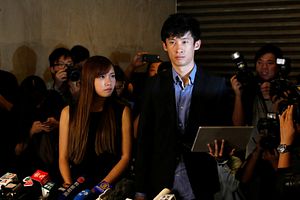The two elected legislators at the center of the oath-taking saga that has shaken Hong Kong’s judicial core have had their appeals dismissed by the Court of Appeal.
In early November, Hong Kong’s chief executive CY Leung and his Justice Secretary Rimsky Yuen filed for an emergency judicial review of the two newly-elected legislators’ behavior at their swearing-in ceremonies in October. The Youngspiration political party’s Sixtus “Baggio” Leung and Yau Wai-ching used their respective swearing-in ceremonies to make a statement against the Hong Kong and Chinese governments, refusing to acknowledge China’s sovereignty over the city, and pledging their allegiance to the “Hong Kong nation.” They also made use of what was deemed a derogative term for Chinese people.
Controversially, China stepped in to make an interpretation of Hong Kong’s mini-constitution, the Basic Law, before the court handed down their ruling, and effectively repealed the two’s right to take their seats in the Legislative Council, as well as any rulings on the matter by any court of Hong Kong. In their interpretation, Beijing set out the conduct and spirit in which the oaths should be taken, a very subjective interpretation at best. Hong Kong’s Court of First Instance eventually ruled along the same lines as Beijing’s decision, which led to the appeal by Yau and Baggio Leung.
The Court of Appeal cited a 1999 case from the Court of Final Appeal, where it was held that Beijing’s interpretations of the Basic Law have a retroactive effect: “The Interpretation, being an interpretation of the relevant provisions, dates from 1 July 1997 when the Basic Law came into effect. It declared what the law has always been.”
The High Court’s Chief Judge Andrew Cheung Kui-nung, Justice Johnson Lam Man-hon, and Justice Jeremy Poon Shiu-chor presided over the hearing. They said the Basic Law trumps Common Law, which is the modus operandi in Hong Kong, and that the Court of Appeal had no jurisdiction over Beijing’s ruling.
“The view of a common law lawyer, untrained in the civil law system, particularly the civil law system practiced on the Mainland, is, with respect, simply quite irrelevant,” the judges said.
Counsel for the government compared Beijing’s ruling to that of a headmaster giving directions to a teacher, and that the teacher needs to “follow the instructions.”
Baggio Leung said he respected the court’s decision, though he did not agree with it. He expressed regret in being unable to protect Hong Kong from the “meddling hands” of the Chinese government, and said that he was upset that he could not defend the election results as a democratically elected official.
Yau and Baggio Leung now have the opportunity to make an appeal to the Court of Final Appeal, though the pair have shown reluctance to do so, in part due to the high costs involved – which could amount to a seven-figure Hong Kong dollar amount. There is also fear that in doing so they may further destabilize the judicial system. Their legislative seats are deemed automatically vacant under the original ruling, with Hong Kong’s pro-Beijing political parties calling for immediate by-elections.

































